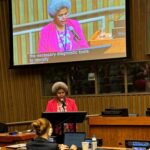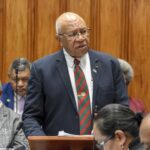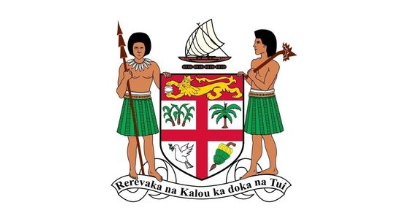
Hon. Qereqeretabua represents Fiji at the high level meeting on AMR
01/10/2024
PM Rabuka updates parliament on Fiji’s Foreign Policy White Paper
01/10/2024Published On: 01/10/2024
Salutation
Ni sa Bula Vina’a and a very good morning to you all.
Honorable Speaker, please allow me to greet our Fijians watching the proceedings via television or on livestream.
Development of the Foreign Policy White Paper (FPWP)
One of the important steps that the Coalition Government took since coming into office is to put in place important rebuilding blocks that provide clarity, direction and certainty for Fiji and its peoples. Foreign Policy is one of them.
Earlier in the year, I mandated the Ministry of Foreign Affairs to produce Fiji’s Foreign Policy White Paper (White Paper). To develop a document that will articulate Fiji’s Foreign Policy priorities and guide its international engagements in the next decade.
Mr Speaker Sir, as part of the formulation, a whole- of-Government process was activated and the views of Ministries, agencies and entities outside of the public sector were incorporated.
A Reference Group was also engaged comprising renowned persons who are current and former diplomats, former Permanent Secretaries, former Ministry of Foreign Affairs Ministers and diplomats, leaders and scholars in foreign relations with long-
standing experience at the national, regional and international levels.
Mr Speaker Sir, the Steering Committee also led by the Permanent Secretary for Foreign Affairs, was established with the support of a technical advisor who was engaged to provide expert support. The expert, Professor Peter Varghese, is the Chancellor of The Queensland University, a former diplomat, a former Secretary of Australia’s Department of Foreign Affairs and External Trade.
Mr Speaker Sir, The Ministry of Foreign Affairs allocated 6 months to this project. I am pleased to inform the House that the project completed its work on time that culminated on Monday 23 rd September 2024, when I launched Fiji’s Foreign Policy White Paper at the GPH, with invitations extended to all members of this august House. This is a first for Fiji and the launch was a landmark occasion in Fiji’s history.
Foreign Policy White Paper Focus
Mr Speaker Sir, before I elaborate on the white paper, I would like to take this opportunity to welcome Assistant Ministers (Hon. Esrom, Hon. Lenora, Hon Tubuna) and the Leader of Opposition (Hon. Seruiratu) and Leader of the G9 (Hon. Naivalurua) on
their return representing Fiji to the 79 th United Nations General Assembly.
I know that having returned from their respective engagements at the high level forums of the UNGA, they would be pleased of Fiji’s first ever Foreign Policy White Paper.
As I mentioned during the launch, the White Paper outlines the path that Fiji will follow to meet the complex foreign policy landscape and its challenges, we face as a nation. It is the definitive statement of the Government’s foreign policy and Fiji’s place in the world.
Mr Speaker Sir, the White Paper explains how Fiji sees itself and how we wish to present ourselves to the world. It also outlines Government’s foreign policy initiatives, including the promotion of the Ocean of Peace which is the single most significant contribution that Fiji has made to peace and security in our neighbourhood and the broader Indo-Pacific region.
The Policy also reaffirms the central position of the Pacific region in our foreign policy calculations and that in all we do, we will put the Pacific family first.
Mr Speaker Sir, the foundation of this White Paper is a whole-of-nation approach that integrates all elements of policy, domestic and external, and recognises that our security and prosperity ultimately depend on a clear-eyed view of our national interests and values and how best to advance them.
The White Paper is also reflected on Chapter 3 of Fiji’s National Development Plan and is the proposed response to the current National Security and Defence Review. Together these forms the foundation of the Government’s strategy to advance Fiji’s strategic and economic interests and strengthen its social cohesion.
What follows builds on the three interconnecting themes of Fiji’s foreign policy: sovereignty, security and prosperity. These are the traditional pillars of foreign policy but the context in which we must pursue them has profoundly changed.
The White Paper states Fiji’s identity and values. It states where we stand on issues. While some areas may not be popular to some, I had remarked in an earlier speech in this House, that the Government stands for what is right for Fiji, not necessarily what is popular.
Understanding the Foreign Policy White Paper
Mr Speaker Sir, the White Paper is made up of three complementary elements, namely analysis, policy positioning and the machinery of delivery.
The White Paper comprise eight chapters. I will expound each Chapter briefly, Mr Speaker Sir, and I ask that we peruse the document to enable us to understand its contents and draw informed conclusions through the following lenses.
The White Paper:
a. Is different from other documents;
b. Is a headline document;
c. comprise high Level Statements;
d. Is not a checklist of all we are doing in our foreign policy;
e. Is not a catalogue of all our bilateral and multilateral relationships and activities.
Mr Speaker Sir, in addition, the White Paper:
a. sets out the underlying principles of Fiji’s foreign policy, our overarching objectives and our broad priorities;
b. captures the way in which domestic and foreign policy are intertwined;
Page 9 of 15
c. allows flexibility to work on issues without being constrained by specificity;
d. allows for context and nuance to be made for circumstances that Fiji might find itself in;
e. is further unpacked into the 2024-2027 Strategic Plan of the Ministry of Foreign Affairs, that guide its operationalisation through the Operational and Business Plans.
The White Paper is also the basis for Ministries to connect and coordinate across the government system and in areas touching external interactions.
Foreign Policy White Paper Structure
Mr Speaker Sir, Chapter One of the White Paper examines Sovereignty, with a focus on Identity and Values. It defines who we are and what we believe in.
It presents Fiji to the world and emphasizes the characteristics that define our society and our values. This is central to how we engage with the world.
Further, the chapter delineates our interests, our international relationships, the ideas we bring to building a stronger region and the bilateral and multilateral investments to be undertaken to project the Fijian society.
Chapter Two focuses on Security with the preamble on Fiji’s physical security and border protection, economic security, environmental sustainability and the capacity to address non- traditional threats and challenges to social cohesion.
It highlights Fiji’s leadership and stewardship roles in the Pacific, the leverage we have as a regional hub, the influence on regionalism, broader multilateral cooperation and the Ocean of Peace.
Mr Speaker Sir, Chapter Three examines transnational security issues, and poses strategic remedies to the transnational challenges which have the potential to erode social stability, wreak havoc on livelihoods, threaten the health of our community and the sustainability of our environment.
Chapter Four addresses Fiji’s vulnerability to climate change. The chapter proposes the need for national policy setting and unremitting advocacy for action at regional and global level. This is in addition to the grounds set on the importance of comprehensive climate governance, the green economy, SDGs, the National Oceans Policy and investments in sustainability.
Mr Speaker Sir, Chapter Five examines Fiji’s approach to bilateral relations bearing in mind that there are no neat distinctions between bilateral and multilateral diplomacy; and that the success in one helps build success in the other.
It singles out that the texture and priorities of our relationships are inevitably shaped by Fiji’s geography, history and values. The ‘family first’ approach for the region and the links with key strategic and traditional partners beyond the region are important to foster familial bonds and shared prosperity.
Chapter 6 on Prosperity, Mr Speaker Sir, stresses the importance of centrally advancing Fiji’s economic interests for all Fijians.
It highlights the importance and quality of our domestic economic policy settings, the enterprise of Fijian businesses, the hard work of Fijian labour and our ability to effectively navigate the regional and global economies and their underpinning institutions.
It states what the backbone of Fiji’s economy is and the need to empower enterprises is fundamental for fostering inclusive growth and reducing income inequality.
The chapter further expounds the importance of an open economy, trade and investment liberalisation, the growth of the Fijian diaspora around the world and their economic importance to our country.
The Foreign Policy and Development Assistance at Chapter Seven, Mr Speaker Sir, highlights the important support of our international partners and the need to manage these relations across Government.
It places importance on the work of diplomatic missions, honorary consuls and trade commissions to promote Fiji’s economic interests and attract foreign investment. There is emphasis on the need for robust systems for coordinating, monitoring and evaluating development support and outcomes.
Chapter Eight, Mr Speaker Sir, sets out the Government’s approach to implementing Fiji’s foreign policy and the systems and resources required to drive the whole of government machinery. The chapter also looks at policy stewardship, coordination
and management and the governance structure to churn out professional cohorts with appropriate skillsets.
Closing
Mr Speaker Sir, I conclude with my thanks to all officials and expertise under the leadership of the Permanent Secretary for Foreign Affairs, in the formulation of this document.
I acknowledge the wise counsel of the Reference Group which helped guide its preparation. I sincerely thank the White Paper’s principal drafter, Mr Peter Varghese AO. I acknowledge the Honourable Ministers and their Permanent Secretaries, the
Honourable Leader of the Opposition, the Chairman of the Great Council of Chiefs, former Ministers, Seniors Officials and Fijian Diplomats, Academia, industry representatives, regional organisations and members of our community who came forward and
shared their knowledge and experience.
Once again, I acknowledge with appreciation the Government of the Commonwealth of Australia, and its High Commissioner in particular, HE Ewen McDonald for the technical and financial support provided through our renewed and elevated Vuvale Partnership.
Vina’a va’alevu and God Bless Fiji.



